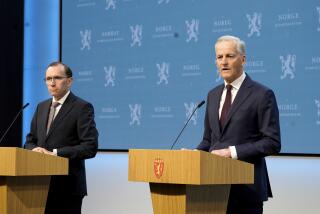Vatican to Recognize Independent Croatia, Slovenia
- Share via
VATICAN CITY — Appalled at the seemingly endless violence that has torn Yugoslavia to pieces, the Vatican on Friday joined Italy in announcing that it would formally recognize the independence of the largely Catholic republics of Croatia and Slovenia.
Fresh Yugoslav attacks on Croatian cities Friday underlined Vatican alarm. In Belgrade, the federal prime minister resigned in disgust. And the fourth of the six Yugoslav republics said it would seek recognition as an independent nation.
Echoing a similar decision Monday by the European Community, the Holy See, which maintains diplomatic relations with more than 100 nations, said it would recognize breakaway Yugoslav republics that pledge democratic rule, including minority rights; respect existing borders, and promise peaceful resolution of disputes.
On Thursday, Italy said that it, like Germany, considered that Croatia and Slovenia met the European criteria and promised formal recognition on Jan. 15.
A Vatican statement on Friday was less specific. But while saying its decision was not aimed at any of the parties, the statement pointedly accused the Yugoslav army--which, effectively, has become the Serbian army--of “burying” chances for peace.
“Croatia and Slovenia have asked the international community and therefore even the Holy See, for recognition,” said a statement by papal spokesman Joaquin Navarro. “Once their willingness to fulfill conditions . . . has been ascertained, the Holy See will not fail to accept the request, recognizing the sovereignty and independence of the republics.”
On Friday, the powder-keg republic of Bosnia-Herzegovina, uneasily shared by Serbs, Croats and Slavic Muslims, voted to seek EC recognition of its independence. Leaders of the southern republic of Macedonia made the same decision Thursday, leaving Serbia and its ally Montenegro as the only two republics content to remain in what was once Yugoslavia.
The Vatican action seems likely to cheer the Croats and Slovenes. But it probably will infuriate Serbia, which has accused the Vatican of being a principal instigator of the decision by the two republics to declare independence last summer, a decision that sparked what has become an uncontrollable, nation-breaking civil war.
There is a particularly strong religious element in the ethnic strife between the Orthodox Serbs and the Catholic Croats. Leaders of the Orthodox church spurned a Vatican invitation to attend a European synod of bishops earlier this month, and Belgrade, the federal and Serbian capital, has been the site of anti-Vatican demonstrations.
A closely held Vatican situation report last month estimated 10,000 have died in ethnic strife. Among the billions of dollars in property losses has been the destruction by the army and Serbian irregulars of more than 250 churches in Croatia, all but a handful of them Catholic.
The 12-nation EC, which has made repeated, fruitless efforts to halt the fighting, accuses Serbia and the Serbian-led federal army of being the aggressor in a one-sided battle for territory in Croatia; the Serbs have said they hope to defend the 12% Serbian minority in Croatia, where there is a history of fascist massacres of their people. More than half a million residents have fled their homes in Croatia to escape the violence.
Federal Prime Minister Ante Markovic, a Croatian moderate who had strongly defended the now vanished authority of a central Yugoslav government, resigned Friday amid reports of new army shelling of the Croatian city of Sisak, about 30 miles southeast of the republic’s capital at Zagreb.
More to Read
Sign up for Essential California
The most important California stories and recommendations in your inbox every morning.
You may occasionally receive promotional content from the Los Angeles Times.









